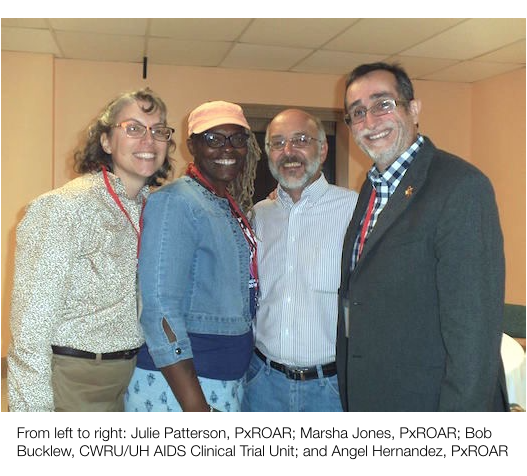November 17, 2014
Julie Patterson, member of AVAC’s US advocacy program PxROAR, describes highlights and strategies from this year’s C2EA national activist summit in Ohio: The push for state-driven plans to end AIDS and the use of data to inform advocacy.
In October, the annual Campaign to End AIDS (C2EA) Leadership and Advocacy Summit convened in Cleveland, Ohio, for four days of activism, networking, mobilization and education. At the outset, the goal of the summit was to create and support alliances and partnerships that will strengthen and mobilize people from all parts of the country within the movement to end the HIV & AIDS epidemic.
C2EA, a national coalition founded by Housing Works, is typically very organic and grassroots with an action focus. This year’s summit was a phenomenal experience – inspiring and visionary. There were many long-term survivors involved, including several who’ve been positive for over 30 years. It was such an honor to be among them. The planning committee and organizers of the summit did an amazing job!

One personal highlight was co-moderating the Thursday morning panel with a C2EA Youth Action Institute leader named Alfredo Smith. We were tasked with introducing the panel and fielding questions. Panelists included: Charles King, Housing Works; Jeffrey Crowley, O’Neill Institute and former Director of the Office of National AIDS Policy in the Obama administration; Patrick Beatty, Ohio AIDS Coalition; Chris Ritter, Ohio activist; and Tracy Jones, AIDS Taskforce of Greater Cleveland.
Alfredo handled responses, and I captured the dialogue on flipcharts entitled, “Where we are now?”, “Where are we going?”, “How will we get there?” and “Next steps?” The panel and C2EA participants bounced back and forth between Ohio and national needs. Also, Mr. King spent a good deal of time introducing the concept of the NY Plan to End AIDS. As a result, he fielded several questions regarding the PrEP component of the plan and did a nice job referencing research as well as anecdotal information. The discussion got a bit heated at one point, especially when one of my friends who works for the American Health Care Foundation, known for its vociferous PrEP skepticism, voiced concerns about Gilead and their profit motive. The audience finally asked the panel to move on to other non-PrEP topics!
At the summit, participants had an opportunity to develop an AIDS-Free Campaign for their respective states. With so many people from Ohio, there was a special emphasis on the needs of our state. Given a new director of the Ohio AIDS Coalition and the momentum from this conference, Ohio needs to pick up the baton and develop a plan to end AIDS in Ohio!
Another personal highlight was the Friday morning session on HIV Prevention Research Advocacy that I co-hosted with Angel Hernandez and Marsha Jones. Angel was very articulate about the PxROAR, a national prevention advocacy group run by AVAC that we three belong to, and spoke quite eloquently about some of the highlighted HIV prevention research advocacy key terms, such as informed consent. Marsha chimed in at various points and always offered a grounded perspective. She also knew the members of the group well enough to keep people on track and civil (when it got heated).
This was a group that was not used to thinking of HIV prevention as a core component of ending the epidemic, so we focused our talk on describing HIV prevention research and implementation advocacy and identifying specific strategies. We also gave a couple of examples of advocacy topics: the impending FACTS 001 microbicide results and the recent early unblinding of the PROUD PrEP study.
There were some old-timers who’d been on community advisory boards (CABs) and in clinical trials for years who helped us to get our messages across. We all emphasized that you don’t have to join trials to have an influence on them. We had to repeat this many times – it was a hard thing for this group of HIV activists to move past.
We encouraged the C2EA participants to think in a new way about the value of data and research to guide their own advocacy goals. There seemed to be a group epiphany that data could help them, so they should try to understand it. We were thrilled!